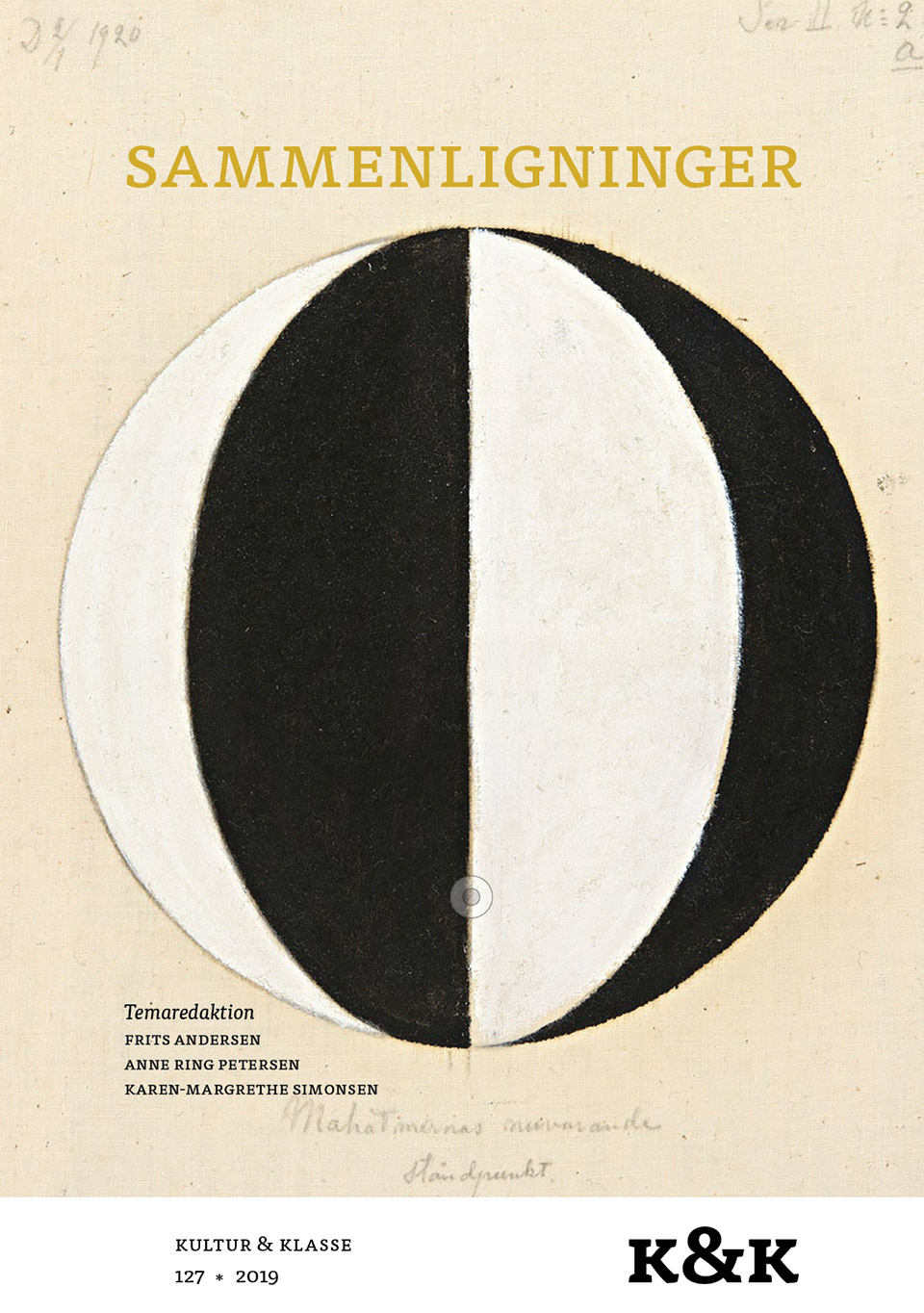Til sammenligning
En retorisk tilgang til intertekstualitet
DOI:
https://doi.org/10.7146/kok.v47i127.114746Nøgleord:
Intertekstualitet;referencer;komparatisme;Gérard Genette;Julia Kristeva;Roland Barthes;Jan Kjærstad;Resumé
Generally, the conception of intertextual references in literary theory has been either very broad or very narrow and detail-oriented. On the one hand, Roland Barthes and Julia Kristeva conceive of intertext as a universal feature of all texts. No text is original and made by itself isolated from those existing before it. All texts, in short, are intertexts because they refer to other texts, conventions, and presuppositions beyond authors’ intentions. But this broad concept is difficult to work with in analyzing works of literature. It poses problems of identification and does not mark out a manageable area of investigation or object of attention with the undefined and infinite discursive space it designates and its idea about anonymous citations. Generally, the conception of intertextual references in literary theory has been either very broad or very narrow and detail-oriented. On the one hand, Roland Barthes and Julia Kristeva conceive of intertext as a universal feature of all texts. No text is original and made by itself isolated from those existing before it. All texts, in short, are intertexts because they refer to other texts, conventions, and presuppositions beyond authors’ intentions. But this broad concept is difficult to work with in analyzing works of literature. It poses problems of identification and does not mark out a manageable area of investigation or object of attention with the undefined and infinite discursive space it designates and its idea about anonymous citations. On the other hand, we have the more restricted view that focuses on specific, readily recognized signs of intertextual relations between literary texts. Gérard Genette offers a vocabulary to describe the interaction between only two identifiable texts. In this article, I shall propose a third alternative that takes the middle ground and investigate what a rhetorical approach to intertextuality means for the understanding of the concept of comparison.
Referencer
Behn, Ari. ”De unge dør – skriv for livet!” Dagbladet 5. august 1999.
Bloom, Harold. A Map of Misreading. New York: Oxford University Press, [1975] 2003.
Bloom, Harold. The Anxiety of Influence: A Theory of Poetry. New York: Oxford University Press, 1973.
Genette, Gérard. Palimpsests. Literature in the Second Degree. Trans. Channa Newman and Claude Doubinsky. Lincoln and London: University of Nebraska Press, [1982] 1997.
Juvan, Marko. History and Poetics of Intertextuality. West Lafayette, Indiana: Purdue University Press, 2008.
Kjærstad, Jan. Kjærstads Matrise - Samlede essays med bonusspor. Oslo: Aschehoug, 2007.
Kjærstad, Jan. Oppdageren. Roman. Oslo: Maxi-Bok fra Aschehoug, [1999] 2001.
Kjærstad, Jan. Erobreren. Oslo: Maxi-Bok fra Aschehoug, [1996] 2001.
Kjærstad, Jan. Forføreren. Oslo: Maxi-Bok fra Aschehoug, [1993] 2000.
Kraglund, Rikke Andersen. Kjærstad. Referencer i et forfatterskab. Aarhus: Aarhus Universitetsforlag, 2018.
Kongslien, Ingeborg. ”Mennesket i tekst og teori. Jan Kjærstads Homo Falsus.” Norsk Litterær Årbok. Oslo: Samlaget, 1988.
Kristeva, Julia. Revolution in Poetic Language. Trans. Margaret Waller. New York: Columbia University Press, 1984.
Mann, Thomas. Joseph und seine Brüder. Frankfurt am Main: S. Fischer Verlag, [1933-1943], 2011.
Moraru, Christian. Intertextuality. Routledge Encyclopedia of Narrative Theory. Ed. David Herman, Manfred Jahn and Marie-Laure Ryan. London and New York: Routledge, [2005] 2008.
Orr, Mary. Intertextuality. Debates and Context, Cambridge: Polity, 2003.
Phelan, James and Peter J. Rabinowitz. “Narrative as Rhetoric.” Narrative Theory: Core Concepts and Critical Debates. Columbus: Ohio State Univ. Press, 2012.
Shklovsky, Viktor. Theory of Prose (Oversat af Benjamin Sher fra O teorii prozy). Illinois: Dalkey Archieve Press, [1929] 1990.
Wolf, Werner. The Musicalization of Fiction – A Study in the Theory and History of Intermediality. Amsterdam: Edition Rodopi B.V., 1999.
Downloads
Publiceret
Citation/Eksport
Nummer
Sektion
Licens
Tidsskriftet følger dansk ophavsret.





